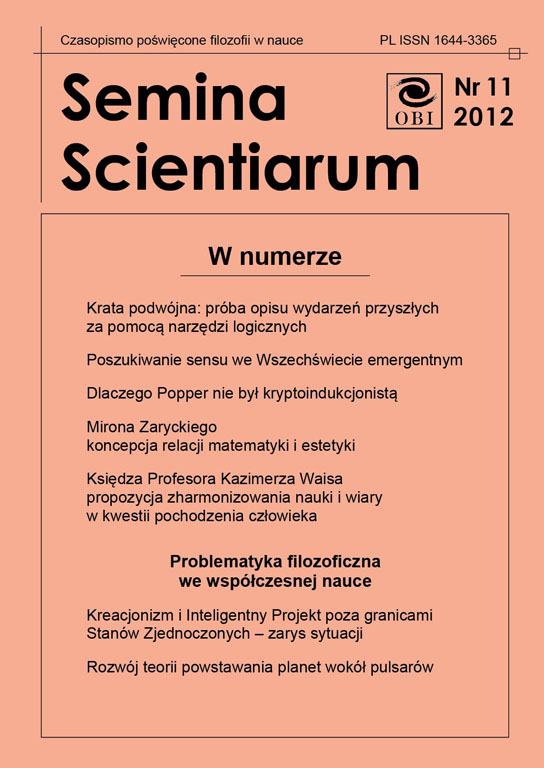Kreacjonizm i Inteligentny Projekt poza granicami Stanów Zjednoczonych – zarys sytuacji
DOI:
https://doi.org/10.15633/ss.470Słowa kluczowe:
creationism, evolution, polls, intelligent design, Islam, education, Russia, Turkey, South AfricaAbstrakt
Contrary to stereotypical opinions which associate creationism and Intelligent Design (ID) movement only with American protestants, the phenomena cross national and denominational boundaries. After the USA, the second most important centre of creationism is the Muslim world. The example of Turkish creationist environment is given. The presence of creationism/ID in western Europe is interpreted as an effect of presenting the false alternative between science and religion to the public and poor training in data analysis among citizens. The specific character of Russian and South African creationism is considered. The missionary activity of creationist organisations, especially in South Korea, Hong Kong and Pacific region is described. Moreover, some problems connected with polling creationism are pointed out, a number of educational and legal issues is specified and psychological/social elements of supporting creationism/ID are mentioned.Bibliografia
Bechtel D., Creationism controversy evolves, 28.11.2007, <http://www.swissinfo.ch/eng/Home/Archive/Creationismcontroversy evolves.html?cid=6283640>, 15.02.2012.
Vertbnov S.., Obwa biologi, Svto-Troickaa Lavra, Moskva 2005.
Cl´ement P., Quessada M.P., Laurent C., Carvalho G., Science and Religion: Evolutionism and Creationism in Education. A survey of teachers conceptions in 14 countries, 2008, <http://repositorium.sdum.uminho.pt/bitstream/1822/8934/1/IOSTE Evolution.pdf>, 13.02.2012.
Clouser R., „Is Theism Compatible with Evolution?”, [w:] R. T. Pennock [red.], Intelligent Design Creationism and its Critics: Philosophical, Theological, and Scientific Perspectives, MIT Press, Cambridge (MA)-London 2001.
Darwin Survey Shows International Consensus on Acceptance of Evolution, 30.06.2009, <http://www.britishcouncil.org/darwin now surveyglobal.pdf>, 12.02.2012.
Doughty J., Doughty S., Creationism in Russia,<http://www.icr.org/article/creationism-russia>, 16.02.2012.
Edis T., „Cloning Creationism in Turkey”, Reports of the National Center for Science Education, 6 (1999), t.19, <http://ncse.com/rncse/19/6/cloning-creationismturkey>, 13.02.2012.
German Scientists Concerned About Rise in Creationist Belief, 02.11.2006, <http://www.dw.de/dw/article/0„2222454,00.html>, 15.02.2012.
Gross M., „US-style Creationism Spreads to Europe”, Current Biology, 8, t.12(2002).
Guessoum N., Islam’s Quantum Question. Reconciling Muslim Tradition and Modern Science, I.B. Tauris, London-New York 2011
<http://tr.wikipedia.org/wiki/Harun Yahya>, 14.02.2012.
Hyon C., The Creation Science Movement in Korea, <¡http://www.icr.org/article/creation-science-movementkorea/>, 16.02.2012.
Ipsos Global @dvisory: Supreme Beings, the Afterlife and Evolution, 25.04.2011, <http://www.ipsos-na.com/newspolls/pressrelease.aspx?id=5217>, 13.02.2012.
Johnson P., Darwin on Trial, InterVarsity Press, Downers Grove 1991.
Joyce J., Who are the British Creationists?, 15.09.2008,<http://news.bbc.co.uk/2/hi/7613403.stm>, 14.02.2012.
Junker R., Scherer S., Evolution: ein kritisches Lehrbuch, Weyel, Gießen 2006.
Kutschera U., Darwinism and Intelligent Design: The New Anti-Evolutionism Spreads in Europe, „Reports of the National Center for Science Education”, 5-6, t.23 (2003). <http://ncse.com/rncse/23/5-6/darwinism-intelligentdesign-new-anti-evolutionism-spreads-e>, 15.02.2012.
Kutschera U., „The German Anti-Darwin Industry”, Reports of the National Center for Science Education, 1, t.28 (2008),<http://ncse.com/rncse/28/1/german-anti-darwinindustry>, 15.02.2012.
Lackowski J., Decentralizacja zarządzania polskim systemem oświatowym a społeczne nierówności edukacyjne, Wydawnictwo Uniwersytetu Jagiellońskiego, Kraków 2008.
Levit I., Hoßfeld U., Olsson L., „Creationism in the Russian Educational Landscape”, Reports of the National Center for Science Education, 5-6, , t.27 (2007). <http://ncse.com/rncse/27/5-6/creationism-russianeducational-landscape>, 16.02.2012.
Lubaddeh J., „Contesting Evolution: European Creationists Take on Darwin”, Spiegel Online, 25.02.2009, , 15.02.2012.
Morris H.M., Clark M.E., The Bible Has the Answer, Master Books, Green Forest 1976.
Morris H.M., The Biblical Basis for Modern Science, Master
Books, Green Forest 1984.
Nasr S.H., „Islam and Science”, [w:] P. Clayton, Z. Simpson (red.), The Oxford Handbook of Religion and Science, Oxford University Press, Oxford-New York 2009, s. 71–86.
Numbers R. (red.), Galileo Goes To Jail and Other Myths About Science and Religion, Harvard University Press, Cambridge (MA)-London 2009.
Numbers R., The Creationists: From Scientific Creationism to Intelligent Design, Harvard University Press, Cambridge (MA) 2006.
Pennock R.T., „Why Creationism Should Not Be Taught in the Public Schools?”, [w:] R. T. Pennock (red.), Intelligent Design Creationism and its Critics: Philosophical, Theological, and Scientific Perspectives, MIT Press, Cambridge (MA)-London 2001.
Retief L.W., „Calvin Meets the Hominins: A Brief History of Creationism in South Africa”, Reports of the National Center for Science Education, 4, t.28 (2008). <http://ncse.com/rncse/28/4/calvin-meets-homininsbrief-history-creationism-south-africa>, 17.02.2012.
Sayin ¨ U., Kence A., „Islamic Scientific Creationism”, Reports of the National Center for Science Education, 6, t.19 (1999),<http://ncse.com/rncse/19/6/islamic-scientificcreationism>, 14.02.2012.
Serbia Reverses Darwin Suspension, 09.09.2004 <http://news.bbc.co.uk/2/hi/europe/3642460.stm>, 16.02.2012.
Shipman P., „Turkish Creationist Movement Tours American College Campuses”, Reports of the National Center for Science Education, 5, t. 26 (2006). <http://ncse.com/rncse/26/5/turkish-creationistmovement-tours-american-college-campuses>, 14.02.2012.
Stephens T., Swiss drag knuckles accepting evolution, 09.10.2006, <http://www.swissinfo.ch/eng/Home/Archive/Swiss -drag knuckles accepting evolution.html?cid=70292>, 15.02.2012.
Thompson B., The Scientific Case for Creation, Apologetics Press, Montgomery 1986.
Van Till H.J., „The Creation: Intelligently Designed or Optimally Equipped?”, [w:] R. T. Pennock (red.), Intelligent Design Creationism and its Critics: Philosophical, Theological, and Scientific Perspectives, MIT Press, Cambridge (MA)-London 2001.
Wroe D., Intelligent design an option: Nelson, 11.08.2005,<http://www.theage.com.au/articles/2005/08/10/1123353386917.html>, 17.02.2012
Wynne-Jones J., „Poll Reveals Public Doubts over Charles Darwin’s Theory of Evolution”, The Telegraph, 31.01.2009, <http://www.telegraph.co.uk/news/religion/4410927/Pollreveals-public-doubts-over-Charles-Darwins-theory-ofevolution.html>, 14.02.2012.
Yue V., „A Creationism Row in Hong Kong”, Reports of the National Center for Science Education, 6, t. 29 (2009),<http://ncse.com/rncse/29/6/creationism-rowhong-kong>, 17.02.2012.
Pobrania
Opublikowane
Numer
Dział
Licencja
Prawa autorskie (c) 2012 Justyna Figas-Skrzypulec

Praca jest udostępniana na licencji Creative Commons Attribution-NonCommercial-NoDerivatives 3.0 Unported License.
Twórca oświadcza, że przysługują mu prawa autorskie do utworu i że nie są ograniczone w zakresie objętym niniejszym oświadczeniem oraz że utwór jest dziełem oryginalnym i nie narusza praw autorskich innych osób.
Twórca zezwala Uniwersytetowi Papieskiemu Jana Pawła II w Krakowie na nieodpłatne, niewyłączne i nieograniczone w czasie korzystanie z utworu, to jest:
- utrwalanie i zwielokrotnianie: wytwarzanie egzemplarzy utworu techniką drukarską, reprograficzną, zapisu magnetycznego oraz techniką cyfrową;
- obrotu oryginałem albo egzemplarzami, na których utwór utrwalono (wprowadzanie do obrotu, użyczenie lub najem oryginału albo egzemplarzy, publiczne wystawienie, wyświetlenie, a także publiczne udostępnianie utworu w taki sposób, aby każdy mógł mieć do niego dostęp w miejscu i w czasie przez siebie wybranym);
- włączenie utworu w skład utworu zbiorowego;
- udzielanie przez Uniwersytet Papieski Jana Pawła II w Krakowie sublicencji Creative Commons Uznanie autorstwa-Użycie niekomercyjne-Bez utworów zależnych 3.0 Polska
Uniwersytet Papieski Jana Pawła II w Krakowie udostępnia utwór na Platformie Czasopism należącej do uczelni, na licencji Creative Commons Uznanie autorstwa-Użycie niekomercyjne-Bez utworów zależnych 3.0 Polska. Tym samym uprawnia wszystkich zainteresowanych do korzystania z utworu pod następującymi warunkami:
- zostanie podany autor i tytuł utworu,
- zostanie podane miejsce publikacji (tytuł czasopisma i adres internetowy do oryginalnie opublikowanego utworu),
- utwór będzie dystrybuowany w sposób niekomercyjny,
- nie będą tworzone utwory zależne.

